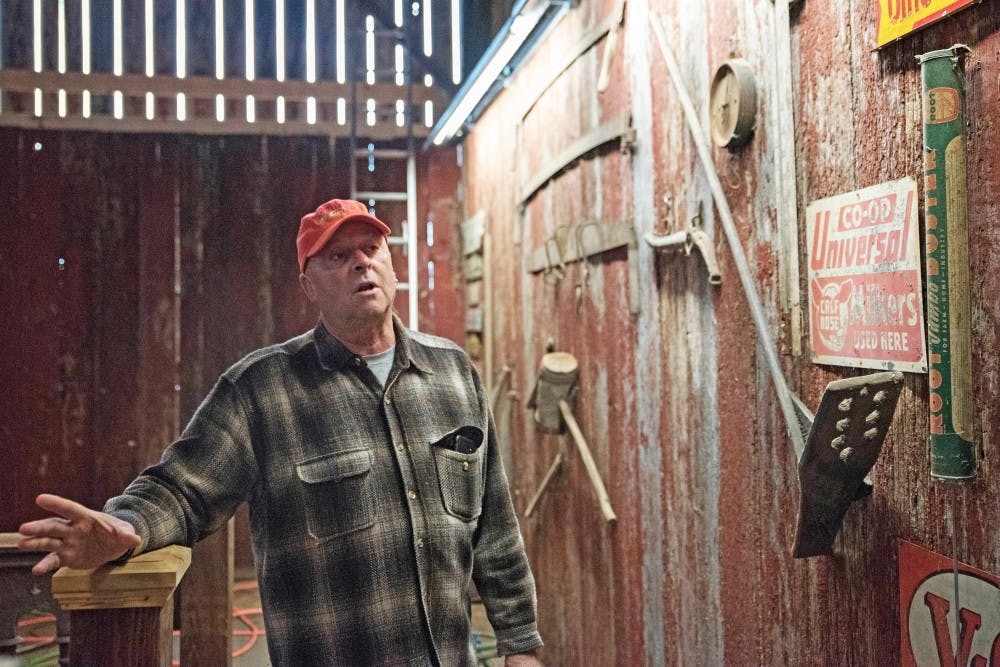The barn on Rick Shriver's property was constructed in the 1890s, and the old structure is filled with tools and signs that mark the decades that have passed. There is antiquated farm equipment, old Farm Bureau signs and the initials of one of Shriver's ancestor's signed on a wooden beam.
Shriver is currently remodeling the barn to help continue a family tradition that is older than the barn: making liquor.
"Both sides of my family have been in the spirits business for five generations," Shriver, who also works as a media arts professor at Ohio University Zanesville, said.
Shriver is renovating his family's barn to turn it into a winery, Willis Hills Farm, where locals can stop and enjoy fruit wine made right in the barn. In most cases, Shriver said, the fruit will be grown right on his property: blackberries, raspberries, apples and peaches.
"I'll make grape wine, but that's not going to distinguish our winery," he said. "I think fruit wine will be our niche."
Opening a winery in his family barn has been a project that Shriver has been working on for several years, and his plan is to open the winery in the summer. The first big step in renovating the barn was constructing a new foundation underneath and setting the barn on top. Once Shriver got that out of the way, he began renovating the barn to turn it into a winery. He recently started a Kickstarter to help cover construction costs.
"This idea has been in the back of my head for a really long time," Shriver said about the project. "Since 2000, I've been trying to figure out what I can do with this property to make it productive, to make it useful, to make it profitable, and I'm hoping this will be the answer."
Shriver said he has made wine since the 1970s, while his family history of making spirits goes back decades. His great-great-grandfather, William Willis made brandy on the property over a century ago. Other relatives made rye whiskey.
But Shriver turned his efforts to winemaking — in part because it is one of the only exceptions to Morgan Township's "dry township" law. He also finds winemaking to be simpler.
"Wine is the easiest thing to make," Shriver joked. "Beer is complicated. Liquor is super complicated."
When the renovation is complete and he can make wine in the barn, Shriver plans to be open for business from March to November, with wine selection based on what is in-season. He also plans to have live music, retail from local Amish merchants and an outdoor deck on one side of the barn. Additionally, Shriver wants to display some of the old tools his family has accumulated over the decades.
"What I hope is that when people come here and look at this barn and the stuff that I'm preserving, they get an idea of what that culture and what that life was like at that period in time because I think it's becoming lost," Shriver said.
The project has the support of the local community. Amy Grove, a board member of the Morgan County Chamber of Commerce, said she hoped it would help draw tourists to the area.
"There's a lot of enthusiasm, there's been a really positive response to the project," she said. "Morgan County doesn't have a winery or brewery and those are on the radar for counties trying to develop a tourism industry. You have to have those things."
Shannon Wells, who works for the county's development office, thought the winery was a good way to show off the area.
"(The winery) would be another place for locals to enjoy, and tourists would be able to see the heritage of our county," she said.
As for Shriver, he said his ultimate goal was to have the winery be a way to sustain the barn and the property so his descendants could reside on there for another century.
"I hope that five generations from now, my great-great-grandkids can say, 'Gee, our great-great-grandpa did a good job," Shriver said.






